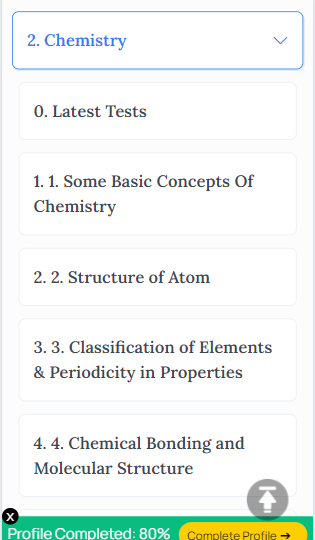You can score good marks in Chemistry’s Chemical Kinetics chapter by practicing the Chemical Kinetics NCERT Questions for the NEET examination on Selfstudys. We aim to cover all the important topics while keeping the weightage of this chapter in mind through these questions.
With the help of the Chemical Kinetics chapter of Chemistry, you can grasp complex topics quickly, revise important points easily, and reframe your understanding of key concepts.
Major Highlights of the Chemistry NEET Examination
The chapter on Chemical Kinetics plays a vital role in chemistry’s class 11 and class 12 NCERT’s standard textbooks. You should practice these questions carefully to not just score higher marks but also get a clear knowledge of the Chemical Kinetics concept. There are a total of 45 chemistry MCQ questions in the NEET examination. Hence, you should start your preparation as soon as you can.
|
Aspect |
Description |
|
Chemistry NEET Exam Conducting Body |
National Testing Agency (NTA) |
|
Exam Mode |
Offline (pen and paper) |
|
Number of Chemistry Questions |
45 Questions |
|
Marking Scheme |
|
|
Sections in NEET Chemistry |
Two sections (Section A and Section B)
|
|
Chemical Kinetics NCERT Question Types |
Multiple Choice Questions (MCQs) |
|
Syllabus |
Based on Class 11 and 12 Chemistry curriculum outlined in NCERT textbooks |
|
Topics Covered |
Includes Inorganic Chemistry, Organic Chemistry, and Physical Chemistry |
NCERT Important Question for Chemical Kinetics in English
You can pick the Selfstudys website to access and attempt the NCERT Important Question for Chemical Kinetics in the English language. Most NEET aspirants find it easy to solve the Chemical Kinetics questions in English to have better clarity of concepts and questions.
Utilize the NCERT Questions Chemical Kinetics for NEET with Solutions
Each chapter in the chemistry syllabus plays a vital role in your aggregate NEET scores. Comparatively, chemistry is the easiest section out of all the NEET subjects. Generally, it takes less time to solve NCERT Questions Chemical Kinetics for NEET with Solutions for exam preparation. At Selfstudys, you can use these solutions to score higher marks and to reinterpret your conceptual understanding.
Why Should You Solve the Chemical Kinetics NCERT Questions for the NEET Examination?
When you’re preparing for the prestigious NEET examination, then skipping any chapter or topic will be foolish. Hence, you shall try to cover most of the sections to unfold these few benefits.
- You get a huge variety of chemistry topics and questions after solving the NCERT important question for Chemical Kinetics.
- The Chemical Kinetics NCERT Based Questions for NEET Chemistry specifically address the core concepts and learning objectives outlined in the NCERT Chemistry textbook for Class 12. It also ensures your focused practice relevant to the actual exam.
- By attempting NCERT Questions Chemical Kinetics for NEET, you can identify areas where you need further revision and clarification. It ensures your comprehensive NEET preparation.
- After successfully answering NCERT Questions Chemical Kinetics for NEET, you build confidence in your ability to tackle Chemical Kinetics concepts in the actual exam. This positive mindset reduces anxiety and helps to focus your approach during the exam.
Steps to Attempt the NCERT Questions Chemical Kinetics for NEET Examination on Selfstudys
Follow these compulsory steps to successfully attempt the NCERT Important Question for Chemical Kinetics on Selfstudys.
- First, search for the homepage of our platform i.e. www.selfstudys.com, and get the below image opened on your device.

- Within the main menu of the website, click on the ‘NEET’ section as highlighted in the image below.

- Now, under the same category, you have to tap on ‘NCERT Based Tests’ and proceed further.

- In the next window, you can look at all the NEET subjects.

- Lastly, In the chemistry subject, you can pick any chapter and begin your preparation.

Key Characteristics of Chemical Kinetics NCERT Questions for the NEET Examination
Here are some key characteristics of NCERT Important Question for Chemical Kinetics, that make it an attractive educational resource for NEET preparation.
- At Selfstudys, there are multiple serial-wise NCERT Questions Chemical Kinetics for NEET available in MCQ formats. These questions are directly relevant to the Chemical Kinetics chapter in the NCERT Chemistry textbook for Class 12.
- The questions of Chemical Kinetics follow the standardized format. Also, It requires you to think outside the box and apply your knowledge in unique ways. It involves inter-related connections between Chemical Kinetics and other areas of science and technology.
- The Chemical Kinetics NCERT Questions for NEET come in a huge variety such as multiple-choice questions, assertion-reasoning questions, match the following, and numerical problems. This strategy makes you well-prepared for your future examination.
- Before solving the NCERT Important Question for Chemical Kinetics, Selfstudys offers general instructions about the duration, marking scheme, and performance analysis index. You should read all the instructions carefully for maximum advantage.
Different Techniques to Use the NCERT Important Question for Chemical Kinetics
To prepare well for the Chemistry Chemical Kinetics section, you must exercise the Chemical Kinetics NCERT Questions for NEET. We have also devised some different tactics and tips for you to follow while utilizing these questions.
- Try to indulge in an active form of engagement. Don’t avoid any questions and read them all carefully. You should understand the typology of the Chemical Kinetics question instead of just selecting answers.
- You should always refer to practicing NCERT Questions Chemical Kinetics for NEET by setting a clock timer. This helps you identify areas where you spent too much time and adjust your timings accordingly.
- After solving multiple sets of Chemical Kinetics NCERT Questions for NEET, you develop different approaches to attempt questions. This way, you get to innovate problem-solving and critical thinking abilities.







 Profile
Profile Signout
Signout














 Quiz
Quiz
 Get latest Exam Updates
Get latest Exam Updates 










